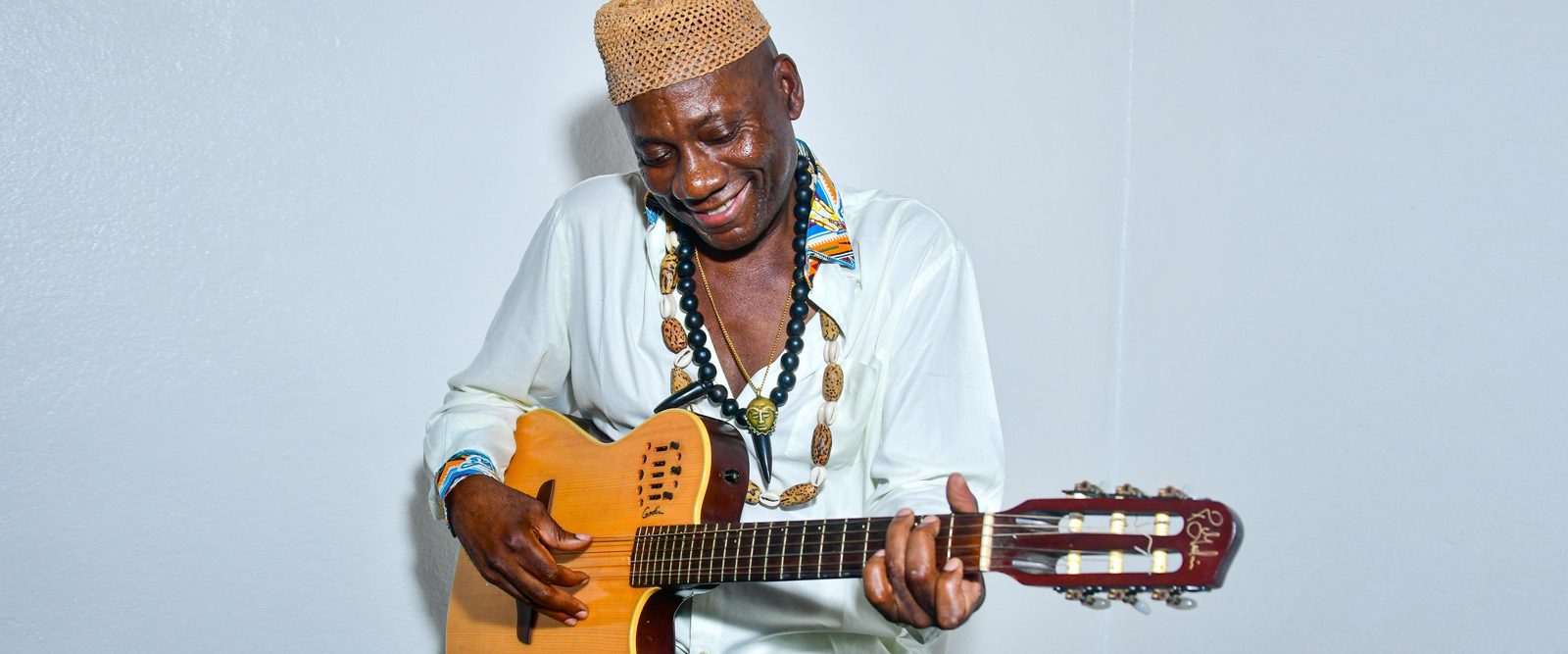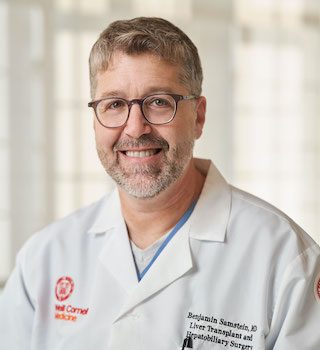A Return to Rhythm: Life After Liver Transplant
Musician Francis Mbappe never let anything get in the way of his music, until he discovered he was in liver failure. After a successful transplant at NewYork-Presbyterian, he’s back on the stage, and feeling the rhythm like never before.

The world was Francis Mbappe’s stage: from his hometown in Douala, Cameroon, where he first learned to play the drums, to the music venues of Paris, where he honed his talents on the bass guitar, to the jazz clubs of New York City, where he played up to four gigs a week.
Nothing could stop Francis’ love for music. His steady groove propelled him through dozens of albums, festivals, and countries over the decades — until his body slowed him down.
He began to feel worn down after his shows; and in 2014, he started to feel a consistent pain in his stomach, sending him to visit the emergency room at NewYork-Presbyterian Lower Manhattan Hospital. Following a series of tests and procedures, specialists later discovered he had pyogenic cholangitis, a chronic infection of the liver and bile ducts, which was causing liver failure.
After undergoing several treatments without improvement, Francis and his care team decided on a next step in 2016: a liver transplant.
“I remember asking, ‘Am I going to be able to play music again on stage?’” Francis says. “I concentrated on pushing myself to recover for my purpose in life.”
A Show-Stopping Diagnosis
Francis first started playing music as a young child, singing and learning percussion with kids in his neighborhood. He built his first guitar with the help of a family friend, then tested his skills on the piano, and eventually developed a love for the bass.
His musical passions led him to many cities around west Africa until he decided to move to Paris, France, and by the age of 19, he was touring internationally with Cameroonian saxophonist Manu DiBango. In 1997, Francis moved to New York, bringing the jazz, funk, rock and African melodies of his band, FM TRIBE, to stages around the city. Throughout his travels and performances, Francis never got sick, he says. But in 2000, abnormal bloodwork results showed his liver was not functioning well, though he never received a diagnosis.
He had few symptoms until stomach pain led him to NewYork-Presbyterian Lower Manhattan Hospital in 2014. “All the time I was feeling a little something, though I didn’t feel sick,” Francis says. “But then the pain in my belly really started to bother me.”
His care team, including several hepatologists, liver specialists, and endoscopists, discovered recurring liver stones and scarring in his bile ducts due to chronic infections.
For over a year, Francis’ specialists explored several comprehensive treatments to improve his health, until he was referred to Dr. Benjamin Samstein, chief of liver transplantation at NewYork-Presbyterian/Weill Cornell Medical Center, to seek further options.
‘A Liver Full of Stones’
When Francis met Dr. Samstein in 2015, he had undergone more than ten endoscopies to clear the stones in his liver, visiting the hospital almost every month. As Dr. Samstein explained the course of his condition to him, it became clear that Francis’ best option would be a liver transplant. Pyogenic cholangitis is caused by a bile duct infection during a person’s youth, Dr. Samstein says. As a result, the bile ducts don’t drain properly, leading to recurrent stones and infections.
“Most of the time, stones can be fixed by removal,” says Dr. Samstein, who is also a professor of surgery at Weill Cornell Medicine. “But Francis didn’t have little stones; he had a liver full of stones. You can imagine it like trying to remove sand from a beach. He was in and out of the hospital, and getting sicker. The definitive treatment we could offer him was liver transplant to get him out of that situation.”

Dr. Benjamin Samstein
Says Francis: “I’m the type of person that when I decide something, I just do it. I was very fortunate to meet Dr. Samstein and arrive at NewYork-Presbyterian/Weill Cornell Medical Center. So, when he told me I needed a transplant, I told him to put me on the list.”
After nearly eight months of waiting, Francis, who was 55 at the time, received a call in July 2016 with an offer for a new liver. “I was feeling worse and worse, and I was ready,” Francis says.
In a five-hour surgery, Dr. Samstein removed Francis’ damaged liver— which had severe abscesses and obstructions throughout his bile ducts — and transplanted the new organ.
Following the procedure, Francis experienced complications, including bile duct blockages unrelated to his initial diagnosis, Dr. Samstein says. He underwent a second operation for bile duct repair in October, along with an additional successful surgery in March of 2017 to repair his bowel.
Francis felt discouraged by the slow recovery, but Dr. Samstein and his care team reassured him they were doing everything they could to give him a second chance at life. “I told him, ‘I understand where you’re coming from and why this is frustrating to you, but I’m not giving up that we have an ability to help you,’” Dr. Samstein recalls.
“It was tough, but I’m a fighter. I told myself, ‘I’m going to come back again, with the help of God,’” Francis says of the months following his transplant.
Making a Comeback
Gradually Francis felt stronger and stronger, and continued to play shows throughout his recovery. He even returned to the hospital, though this time not as a patient, but as a performer during a celebration for liver transplant patients, their families, and care team members.
“Mr. Mbappe is full of life’s energy,” Dr. Samstein says. “Our job is to help people deal with their illness so they can recover that zest for life.”
“I feel happy to just be alive, to return to music,” Francis says. “I feel more creative, calmer, I even feel like I became better with my instrument. Sometimes I even forget I had surgery.”
Six years post-transplant, Francis regularly exercises and returns to see his care team every three months for blood work. He teaches young musicians, spends time with his three daughters, and continues to produce music in his Philadelphia home studio. And he hasn’t stepped back from the stage, performing with his band three times a week, and playing at venues like the Apollo Theater.
“The transplant changed my life. Food tastes differently, I see things differently, I feel things differently,” Francis says. “I hear the music more deeply.”
Additional Resources
Learn more about the Center for Liver Disease and Transplantation at NewYork-Presbyterian.
See how you can sign up to become an organ donor.
Find out more on NewYork-Presbyterian’s comprehensive liver care.
